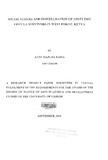| dc.description.abstract | Obstetric fistula is a medical condition in which a woman develops a hole between the
vagina and rectum or the bladder during delivery. In West Pokot, this condition attracts
social stigma, abandonment, seclusion and isolation of the woman from family and
general community. In this sense, obstetric fistula which is a medical condition has
caused a social problem in the region. The condition is treated by corrective surgery.
This exploratory study examined the problems faced by obstetric fistula survivors and
challenges of re-integrating back into the community women who have undergone
corrective surgery in West Pokot, Kenya. The main study objective was to explore the
social stigma faced by obstetric fistula survivors and its effect on their reintegration into
society. In-depth interviews, key informant interviews and focus group discussions were
used to collect data. Eight women, aged between seventeen and thirty years, who had
previously undergone obstetric fistula corrective surgery were interviewed. Questions
about their experiences of living with obstetric fistula and the factors that influenced their
reintegration after surgery were posed. Particularly, their experience of social stigma was
explored. A focused group discussion consisting of obstetric fistula survivors, some who
had earlier participated in the in-depth interviews was held to shed more light on the
topic. Community members participated in a separate focus group discussion. Key
informant interviews were held with two traditional birth attendants, surgeons, nurses and
social workers in the district. The focus of the interviews was to provide information on
how they manage/ support women with obstetric fistula, particularly the reintegration of
fistula survivors into the community. The interviews andsdiscussions were taped then
transcribed. In addition note taking was also employed to guard against technological
failures. Thematic data analysis based on grounded theory techniques was used to
analyze the data.
The obstetric fistula survivors were mostly young women aged between seventeen and
thirty years, with low literacy levels and were either divorced, separated or living with
the,-\: husbands. Most of the survivors developed obstetric fistula delivering their first
child. However a few had other children before the birth that caused the fistula. Survivors
VI
interviewed had lived with the condition for periods ranging between two to five years
before surgery. The study established that social stigma which continues even after
surgery is a major challenge that the women have to deal with daily, posing a great
challenge to the reintegration of survivors. The stigma originates from the cultural beliefs
and practices of the Pokot community. Fistula survivors who experienced social stigma
after surgery were more likely to have problems coping with reintegration than those who
didn't. There were other challenges of coping with after surgery instructions; divorce and
separation; poverty and infertility that must be overcome before a survivor is sufficiently
reintegrated. There is an apparent lack of a comprehensive reintegration program for
obstetric fistula survivors that would address their needs after surgery in this region.
The study recommends that after surgery, obstetric fistula survivors should be helped to
reintegrate back to the community and proposes several avenues through which this could
be done. Of these, long term counselling, income generating activities and education and
skill training were proposed. Family and community support were vital in the
reintegration of obstetric fistula survivors. The community is a major participant in
eliminating social stigma; given that stigma is a social construct. Furthermore, many of
the proposed reintegration strategies largely depend on the community for their success.
The study therefore recommends that reintegration programs must be participatory, with
an integrated approach amongst the various government sectors and NGO's in the region.
-.
Vll | en |

